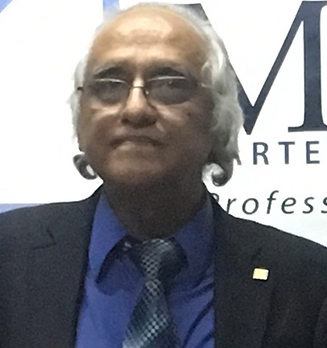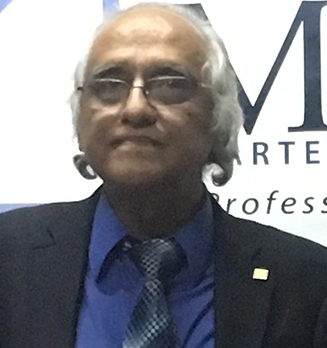The Ministry of the Presidency (MoTP) says that President David Granger at no time sought to discredit achievements in six commodity sectors here which he had told a New York diaspora gathering constituted “the curse of the six sisters”.
In a statement issued just after midnight yesterday, MoTP was responding to a letter by commentator Christopher Ram in the October 1st Sunday Stabroek entitled `What are the real curses’. Ram’s views were also utilised in a news item in the October 2nd Stabroek News headlined `Ram pillories President over `six sisters’ remark, diaspora `brains’’.
MoTP charged that Granger’s remarks at the Diaspora Meet and Greet on September 23 have been skewed in Ram’s letter and do not in any way represent the points the President highlighted at the event in New York.

During his presentation, MoTP said that Granger had stated that Guyana has relied since Independence on the production of primary products in sugar, rice, bauxite, gold, diamond and timber, which he referred to as the ‘six sisters’.
MoTP added that while he acknowledged the value of those sectors, Granger noted that the reliance on the production of primary products has limited the expansion and growth of the economy.
“We live under the curse of the six sisters. As long as you can remember, Guyana has depended on sugar, rice, bauxite, gold, diamonds, timber and they have been faithful to us over the years but some of them tired now. We need to diversify, we need to get away from the spell of these six sisters and ensure that our children have a future other than being cane cutters, our children have a future other than felling timber… We have to go into new industries. We have to go into manufacturing and these new industries. We are going to ensure that new industries fit into our landscape and fit into the economic plans of our country and that is where I turn to you, the members of the diaspora,” the President said.
MoTP charged that Ram used aspects of the President’s comments without context to create the impression that the President was critical of the contribution of those sectors to Guyana’s development and economy.
“In fact, the Head of State is of the view that Guyana must use those abundant resources to revolutionise those sectors, thereby increasing employment and income generation activities, rather than simply relying on the production of raw materials. The Head of State said that the Guyanese diaspora has the technical knowledge, financial resources and skills to help change the reliance on raw resources, which has defined economic activity”, MoTP said.
It added “At no time did the President seek to discredit what has been achieved in those sectors. The thrust of this presentation highlighted how much more can be achieved if Guyana were to convert its raw materials into high quality by-products for international markets”.
In his letter, Ram had said that the sectors the President had associated with the word curses “provide our economy with growth, foreign exchange and taxes, and our people with employment and spending power. Think what will happen to some of the communities if gold, diamond and bauxite mining – which account for close to 20% of GDP and a significant share of the workforce ? were to be relegated to Guyana’s economic dustbin of history. Rice and sugar may account for only 8.6% but they do account for significant foreign exchange earnings and substantial numbers of the workforce. Had the President described the sectors as having challenges, he would have been stating the obvious. But curses, certainly not”.
Ram stated what he thought the real curses of Guyana have been since Independence and which are still being perpetuated:
* abuse of power and corruption for gain for selves, friends and supporters, aided by lack of transparency and accountability;
* racism and racial discrimination in employment and economic opportunities;
* ignorance and incompetence in the understanding and performance of one’s office or job and appointing square pegs in wrong holes;
* dictatorial and authoritarian practices, including manipulating the elections machinery, disregard for the Constitution and constitutional offices and the law, and the insertion of the military in civilian administration;
* nepotism and cronyism with preference for one’s own; and
* insensitivity and arrogance, the belief that those in power know it all and others are unimportant.
MoTP noted that in the same letter, Ram referenced the President’s statement that “We don’t need barrels, we need brains,” and wrote that “…we will find that many persons with brains, who have stayed in Guyana will have to rely on barrels from abroad for their very survival.”
MoTP said that the President stated, “We are going to ensure that new industries fit into our landscape and fit into our plans for the economic development of the country and that is where I turn to you; the members of the diaspora. We don’t need more barrels, we need brains. We all know about the age of the barrels where you pack stuff to send for your families, your relatives but now Guyana is ready to take off. We need your intellectual capital. We need to tap into your expertise and experience, which you have gained here in the diaspora. You have that intellectual capital and with your intellect and our resources, we can bring the two sides together.”
MoTP did not address Ram’s point that the President’s calls on the diaspora have come “in the absence of an industrial or investment policy, or a diaspora policy, or a crime policy” and that a study is needed to identify the skills set the President so much wants to attract.
Also unaddressed by MoTP was Ram’s concern that local skills had been sidelined for apparently lacking the qualification of the “right race”.





